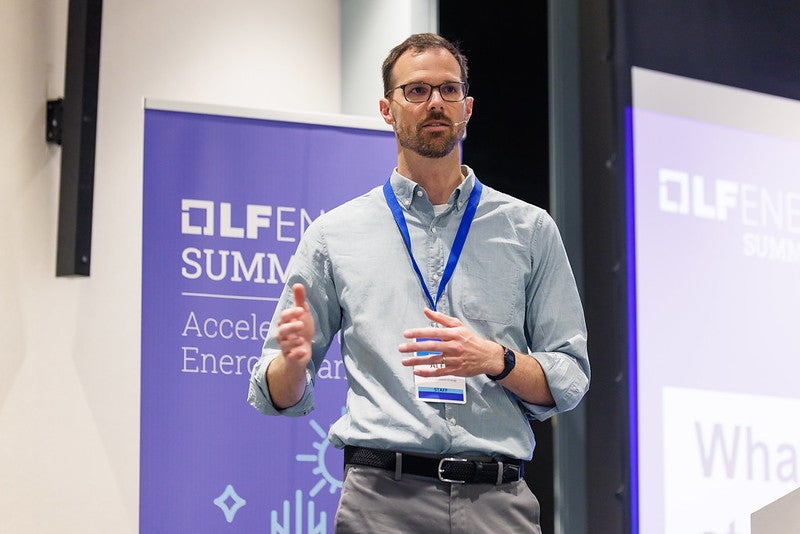LF Energy Summit Recap and Video: The Future of Energy and Open Source
At LF Energy Summit 2024 in Brussels, Alex Thornton, Executive Director of LF Energy, took the stage to lay out a bold vision for how open source technology will drive the decarbonization of global energy systems and emphasized the critical role the community will play in achieving this goal. Here are the key takeaways from his address (full video follows below).
1. Why We Are Here: Tackling Energy’s Biggest Challenges
Thornton posed an essential question to the attendees: “Why are we here?” He highlighted the complexity of the energy transition, acknowledging the irony of emitting significant amounts of carbon to attend an event focused on decarbonization. However, his point was clear—this gathering of minds and resources must create tangible impact in driving forward the energy transition. Without achieving real results, the event would be a waste of time, money, and, importantly, carbon.
Thornton urged participants to use the next two days to focus on solving the most critical energy challenges. The urgency to transition away from fossil fuels, combined with the complexities of modernizing energy infrastructure, means that every effort should count.
2. The Role of Open Source in the Energy Transition
A central theme of Thornton’s keynote was the unique role that open source software plays in transforming the energy sector. He argued that open source solutions are the best tools for digitally optimizing the physical energy infrastructure we already have. While building new infrastructure is slow and expensive, optimizing current assets using digital technologies can accelerate the transition at a fraction of the cost and time.
Thornton made it clear: “The energy transition is also a digital transition.” He pointed out that the most innovative and successful companies—like Google, Microsoft, and Nvidia—are also the most prolific contributors to open source projects. The energy industry should follow suit, adopting open source software to innovate faster and collaborate effectively.
3. LF Energy: A Gym for Open Source Development
Thornton compared LF Energy to a gym, a place where contributors come to build and refine their open source projects. Like a gym provides resources, equipment, and community to help people meet their fitness goals, LF Energy offers governance, collaboration tools, security audits, and more to ensure that open source projects thrive. However, as in a gym, it is up to the participants to do the hard work. LF Energy doesn’t write the code, but it provides the critical infrastructure to help projects scale.
By fostering collaboration among competitors and supporting mission-critical energy projects, LF Energy ensures that the best open source technologies reach the market, furthering decarbonization efforts.
4. Security and Mission-Critical Infrastructure
Thornton emphasized the importance of cybersecurity in open source development, particularly in the energy sector. With the energy transition being vital to the stability of global infrastructure, ensuring that open source tools are secure is paramount. He referenced recent security audits funded by LF Energy that helped bolster the security of key projects like OperatorFabric and CPTH.
Security is a cornerstone of LF Energy’s mission, ensuring that the open source software it supports can meet the rigorous demands of powering modern energy systems.
5. Call to Action: Get Involved and Lead the Transition
Thornton’s message to the audience was clear: LF Energy cannot drive the energy transition alone. He invited everyone—whether they were users, contributors, or members of the open source community—to deepen their engagement. He encouraged companies to move from simply using open source tools to actively contributing, and for existing contributors to take on leadership roles.
The energy transition, according to Thornton, will require widespread collaboration. The open source model, where organizations work together on shared challenges, offers the best pathway to rapid innovation and large-scale decarbonization.
